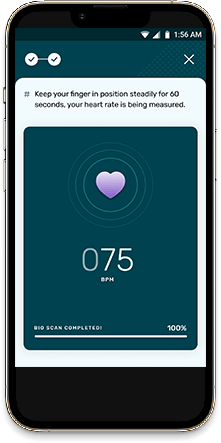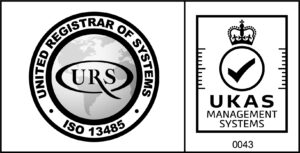Using non-invasive technology, CoHeal.ai enables real-time measurement of vital health indicators, such as Heart Health (including Resting Heart Rate and Heart Rate Variability), Blood Pressure (BP), Oxygen Saturation (SpO2), Blood Glucose and Stress in real-time.
Bio-Scan
HEArt Health
A healthy heart rate is an indicator of a healthy heart. Resting heart rate (RHR) is a snapshot of how well your heart muscle is functioning. Various factors impact RHR, including stress, medications and even caffeine.
A high RHR could be a sign of an infection or heart arrhythmia while a low RHR could signal fatigue or even bradycardia.
Blood Pressure
Blood pressure is a measure of the force that your heart uses to pump oxygen-rich blood out to your arteries. Blood pressure is measured in millimetres of mercury (mmHg).
Systolic pressure is the pressure when your heart pushes blood out and Diastolic pressure is the pressure when your heart rests between beats. Normal range for blood pressure is when readings consistently range from 120mm Hg systolic and 80 mm Hg diastolic.
Oxygen SATuration
SpO2, also known as oxygen saturation, is a measure of how much oxygen your blood is carrying as a percentage of the maximum it could carry. The body maintains healthy SpO2 levels through breathing. For a healthy individual, the normal SpO2 should be between 96% to 99%.
Low levels of SpO2 can result in a serious condition known as hypoxemia. People with certain health conditions such as asthma, heart disease, cystic fibrosis, may need to monitor their blood oxygen levels periodically.
Blood Glucose
Blood Sugar or blood glucose is the measure of glucose concentrated in the blood. Blood glucose mainly comes from carbohydrates in the food and drinks we consume. Blood carries glucose to the cells and is the main source of energy for our body.
Glucose levels are usually lowest in the morning, before the first meal of the day, and rise after every meal for an hour or two before returning to normal. A healthy fasting blood glucose level is around 70 to 99 mg/dL (3.9 to 5.5 mmol/L)
Over time, having too much glucose in our blood can cause serious health problems (diabetes complications). So, it’s important to keep our blood glucose levels within target range.
CARDIO-VASCULAR STRESS
Heart rate and HRV have a direct correlation to stress levels. Stress is triggered when a past event or recently upcoming event is overwhelming. The autonomic nervous system (ANS) affects the heart rhythm on a cellular level. The relaxation response tells your heart to slow down, increasing space for changes between beats (high HRV) and the stress response tells your heart to speed up, decreasing space for change (low HRV).

